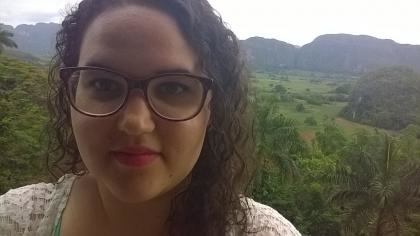UI student learns from ‘great Cuban minds’ on study abroad program
By Lois J. Gray, Iowa Now

This is the view Nadia Doubiany viewed each evening as the sun set from the view of her house in the Habana Vieja neighborhood, where she lived with other students and local Cubans during her study abroad experience last summer. "It was great to live among locals, I got to know the community more intimately and make friends with my neighbors," Dubiany says.
Cuba conjures images of colonial architecture, salsa dancing, old cars, cigars, rich culture, and the legacy of Fidel Castro, just to name of few.
But none of these were what most drew University of Iowa student Nadia Doubiany to the island nation.
Doubiany craved an academic adventure.
“There is, of course, the beauty of the island, the stoic old buildings, the everyday presence of history and revolution,” Doubiany says. “Then there is the music, the dancing, the many diverse and rich cultures of Cuba, the list goes on. But for me, the academic aspect of my visit was the most rewarding.”
This included taking classes on government and politics of Latin America, the Latin American economy, and the cultures and history of Cuba as the only UI student to participate in the summer 2015 University Studies Abroad Consortium (USAC) Havana Program.
The 24-year old UI student, who is working toward a Bachelor of Arts in international studies and human rights, a certificate in fundraising and philanthropy communications, and a minor in Spanish, says the one-month experience exceeded her expectations.
“While studying in Cuba, I learned from Cuban professors who taught at the University of Havana. They offered me such a unique and personal learning experience,” says Doubiany, of Iowa City. “To be in Cuba, learning from great Cuban minds, at a time when so many historical changes are taking place, was truly amazing and unlike anything I've ever experienced. “
In December 2014, President Obama announced the loosening of trade and travel restrictions with Cuba, effective in January 2015. This makes visiting Cuba much easier for Americans than in the last five decades.
However, UI faculty, students, and staff have traveled to Cuba for at least the past 15 years, says Wildenberg de Hernandez, an associate director of UI Study Abroad, though there were several years where travel was virtually impossible due to diplomatic and political policy.
With more than 70 countries to choose from, how did Doubiany decide to study abroad in Cuba?
“I have been interested in Latin America since I began learning Spanish at a young age, and I knew that I wanted to study in that part of the world,” Doubiany says. “I recently became very interested in the Caribbean as well, particularly Cuba, and heard that a program in Cuba was being offered. It seemed like the perfect opportunity for me, so I went for it.”

UI student Nadia Doubiany visits Viñales Valley in Piñar del Rio in Cuba during her summer 2015 study abroad program.
Doubiany says she also gained some important insights about how to live her life more fully.
“One thing that is particularly memorable to me is actually something quite simple—the way of life in Cuba is perhaps what I miss most. There is an attitude of mindfulness and living in the moment—taking time to stop and enjoy the day, spending hours sitting in the park with a cup of coffee,” Doubiany says, “not being in an unnecessary rush, putting more value in relationships with friends and colleagues than in schedules and to-do lists, everyone just doing what they can to get by and make the most out of life.”
Interest, options increasing
Wildenberg de Hernandez says that new programs, countries, and options are always being added to provide as diverse an array of opportunities as possible to enrich students’ academic odysseys.
This includes expanding the number of internship opportunities beginning in summer 2016.
“We will now be offering eight-week summer internships in Barcelona, Berlin, Dublin, London, Milan, Paris, Rome, Santiago (Chile), Shanghai, and Sydney through a new partnership with IES Abroad,” Wildenberg de Hernandez says.
She adds that student interest in study abroad continues to grow. For 2013–14 (the most recent year for which statistics are available), some 1,184 UI students, 874 undergraduates, and 310 graduate and professional students, studied abroad in 70 different countries.
Though cost can be a perceived barrier for some students and families, Wildenberg de Hernandez says that her office gives out more than $600,000 in study abroad scholarships annually.
“Students can use federal or institutional aid that would apply on campus for study abroad,” Wildenberg de Hernandez says. “In many cases, that aid, typically loans, can be expanded to cover the cost of attendance for study abroad including things like international airfare and room and board abroad.”
Doubiany, who is half Moroccan, says she was grateful to be awarded a Diversity Ambassador Scholarship, among others, which made her experience possible.
Benefits to study abroad
Though study abroad has long been known to be a transforming experience, recent research also shows tangible benefits to studying abroad, says Wildenberg de Hernandez.
A recent study conducted at the University of California in Merced gathered statistics from numerous international education resources to try to assess how these skills translate in the future and found:
- 97 percent of study abroad students found employment within 12 months of graduation, when only 49 percent of college graduates found employment in the same period
- 25 percent higher starting salaries for study abroad students
- 90 percent of study abroad alumni who applied got into their first or second choice of graduate school
“Study abroad allows students to approach their field of study from a new perspective. Planning for study abroad in itself is an exercise in decision making, organization and prioritization, obtaining and processing information, and setting goals,” Wildenberg de Hernandez says.
She adds that once abroad, students become better problem solvers because their environment is unfamiliar. Students also enhance their global citizenship skills, which include having an enhanced awareness of global interconnectedness and understanding culture in its context.
And with an increasingly global economy, those who have studied abroad are more attractive to prospective employers than ever before, Wildenberg de Hernandez says.
Doubiany agrees, saying she was able to put her new skills to work immediately in her part-time job as program coordinator for the Council for International Visitors to Iowa Cities, or CIVIC.
“Studying in Cuba has opened my eyes to a new world of possibilities. I learned so much from my courses and experiences, and now I not only hope to return to Cuba but I can see myself working there one day,” Doubiany says.
Her long-term goals include working in community development, poverty alleviation, and rights advocacy for marginalized communities.
“I feel more knowledgeable and experienced in my fields of interest,” Doubiany says, “and I'm so much more excited to start facing the world and to embark on an adventurous and fulfilling career.”
Interested in learning more about study abroad programs like Nadia's? Opportunities to study and learn internationally exist for all UI students. Last year, Hawkeyes in 65 different majors studied in 75 countries worldwide (see more study abroad statistics here.)
The UI Study Abroad Fair will take place on Tuesday, Sept. 15, from 11 a.m. to 3 p.m. on the second floor of the University Capitol Centre. Stop by to learn about opportunities to study, work, volunteer, or intern abroad! Staff will be on hand to answer students' questions.